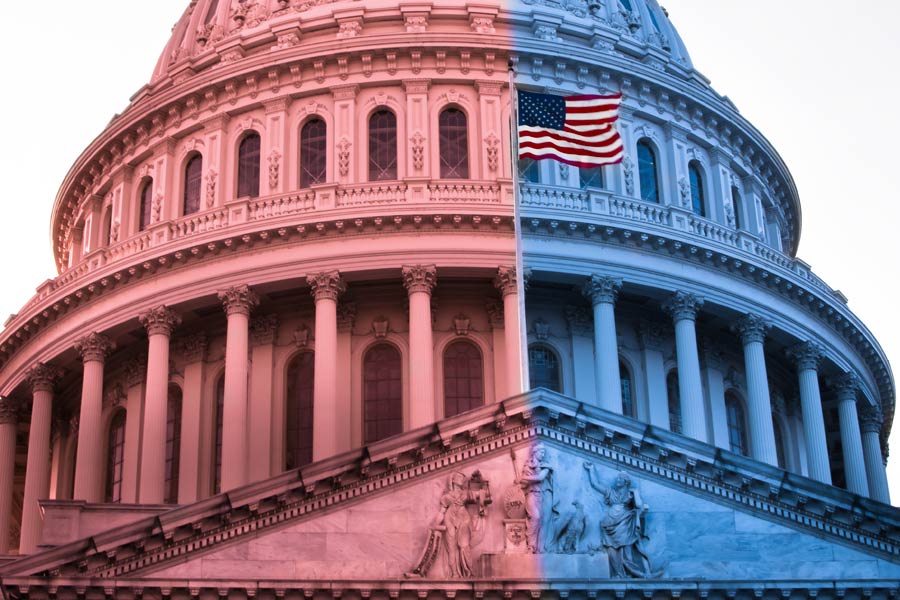
Anyone who even casually follows happenings in Washington, D.C., these days cannot help but notice the stark partisan divide our country faces. And when that chasm is bridged, even briefly, as in the joint singing of “God Bless America” on the Capitol steps after the 9/11 attacks, even the strongest skeptics welcome the detente.
A recent edition of The New York Times featured a story with an unusual title for the reliably left-leaning Old Grey Lady: “The Necessity of Bipartisanship.”
The context was a hotly debated and highly anticipated vote on the $95 billion foreign aid bill for Ukraine, Israel, and Taiwan. Despite 112 Republicans voting “no” on the legislation, it passed in the House, and later in the Senate. But I would only ask the Times: If its staff cares so much about bipartisanship, why do they spend so much time stirring up the dissension?
It’s necessary in politics to sometimes compromise on subjective matters like tax rates or morally neutral budgetary priorities. But it’s an entirely different matter when the issues at stake are morally nonnegotiable, like abortion, marriage, human sexuality, and religious freedom.
The Times’ interest in bipartisanship only when its editors favor it for a particular issue notwithstanding, tensions inside a deeply divided Washington and across the country are growing. Robert Putnam, the political scientist best known for his book Bowling Alone, believes America is more polarized today than during the Civil War.
And if Putnam is correct, we have to ask why. Is it the heated debates over abortion? Over same-sex marriage? Illegal immigration? Regardless, this has not always been the case in America. There have been times when parties and politicians did what they felt was best for the country rather than only what was best for their party.
What Does Bipartisanship Even Mean?
I was thirteen years-old in the summer of 1974 when the Watergate scandal finally blew wide open. On August 7 of that year, Republican leaders in Congress, including Arizona Senator Barry Goldwater, went over to the White House to alert President Richard Nixon that he didn’t have even enough support in his own party to survive an impeachment vote and then trial. And we know the rest of the story: Nixon resigned two days later.
One’s definition and point of reference to what bipartisanship even means and when it even existed at all largely depends on one’s age. Some will point to the “welfare reform” efforts of the 1990s and “tax reform” efforts of the 1980s.
But perhaps the most well-known example of civility in Washington during my lifetime came from Republican President Ronald Reagan and Democrat Speaker of the House Tip O’Neill, who famously toasted their bipartisan accomplishment after both chambers of Congress voted to cut taxes in the 1980s.
Do the Right Thing For the Common Good
The late Senator Daniel Patrick Moynihan (D-NY) famously said, “Everyone is entitled to his own opinion, but not his own facts.” Finding the proverbial “common ground” is impossible if one side sees fantasy as fact. It’s necessary in politics to sometimes compromise on subjective matters like tax rates or morally neutral budgetary priorities. But it’s an entirely different matter when the issues at stake are morally nonnegotiable, like abortion, marriage, human sexuality, and religious freedom.
On all those issues, conservatives hold to positions that have been held by the vast majority of Americans since the nation’s founding. It’s not a coincidence that polarization has risen as liberals have vowed to deconstruct the country. It’s illogical to accuse conservatives of being extremists when it’s liberals are demanding abortion up to birth and holding to the biological lie that men can be women and boys should be allowed to crush girls in sports and invade their private spaces.
Our nation is in desperate need of exceptional individuals who are willing to lay down their partisan arms and their own “facts” in order to do the right thing — not for their party, or a fringe minority of that party, but for the people of our country.
The Apostle Paul directs Christ-followers, “if possible … to live peaceably with all.” He also wrties, “Let each of you look not only to his own interests, but also to the interests of others.” With my cooperative temperament and spirit, I’m drawn to such philosophy. And I contend that it works, not only for Christians like myself, but because it is the right way for human beings to treat each other in search of the common good.
Jim Daly is president of Focus on the Family.

